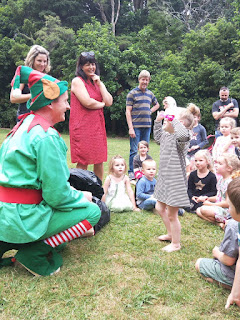Risk
taking is a huge part of what we do at Mairtown, in fact this topic has been previously
blogged, however recently my focus has been on supporting children to take
healthy emotional risks.
When
I was studying to become a teacher I used to think that risk taking was
something thrill seekers do, or is someone who is totally fearless. Actually risk encompasses much more, including physical, emotional and social, what is really important is helping children to learn and
identify what are healthy risks and what are unhealthy risks.

At Mairtown
kindergarten we are passionate about providing children with a rich learning
environment that offers plenty of opportunities to take responsible risks and I
believe it’s wonderful for children to discover and learn for themselves what
their comfort levels are as it is different for everyone.
Being
able to take an emotional risk requires children to move beyond their
comfort zone and push through that funny feeling in their tummy or for others
they may feel worried to take that big step forward to speak in front of their
peers or take that first step to put pen to paper.
“Being
a healthy emotional risk taker enables you to embrace and grow in your life
right now”. (Shakti
Sutriasa, 2016).
Those
who know me, know how passionate I am about setting up challenging obstacle
courses, knowing it might be a bit tricky.
I love to support and encourage children to take a risk, not only physical
but emotional as well. Within our daily
practice there are many emotional risk taking scenarios that our children face,
for example; feeling brave to ask a peer to play, to help a friend in need,
express gratitude and appreciation to others, choosing to be brave to sit with
a different peer at the kai tables or being asked to be our ‘kaia’ to lead our
morning waiata or to put their hand up to ask a question or taking on a role
where they are at the centre of attention and all the focus is on them. It is
these opportunities that offer children meaningful lifelong learning that they
will carry in their kete of knowledge throughout life.


There is plenty of research that
supports children learning to take risks, Davis and Eppler-Wolff state that Risks – good and bad – are inevitable from birth.
Yet, many of us haven’t given much thought to the ways in which risk unfolds. With
a toddler’s first step, he is taking the risk of stepping out into the world – literally
and figuratively. When a preschooler enters his new class of teachers and children
for the first time, he is taking the risks inherent in separating from the only
caretakers he’s known. A shy first grader who raises her hand in class to ask a
question takes the risk of appearing stupid in front of her peers. She risks feeling
embarrassed, or inadequate. Yet her raised hand allows her to take a risk that leads
to feelings of self-assertion and self-expression. (Susan Davis, Ph.D., and Nancy Eppler-Wolff,
Ph.D., 2009)

To
develop emotional risk taking skills requires children to be confident within
themselves and their abilities, to be able to think through problems that they
may face and to be able to think positively, also known as a ‘positive growth
mind set’. This is particularly useful
in those times when children are finding courage to be brave. As children learn and develop their
skills of taking emotional risks, this results in children who have more
resilience and are able to deal with the disappointment that life sometimes
has, including having to wait for a swing to be free, or not being chosen to
have a turn, for instance, in a game, at that very moment.

Life
is all about choices, there are good choices and bad choices, learning to make
good choices I believe is vital for all children to learn. There has been lots of talk at kindergarten
about what a good choice is and what a bad choice is, I believe it is never too
early to learn such valuable life long skills.
Developing resilience is an extremely useful skill when learning to take
emotional risks, this is supported by research that states “Resilience is the ability to steer through serious life challenges and
find ways to bounce back and to thrive.
We are born with the capacity for resilience. But resilience is not something we have or
don’t have. We work on it throughout our
lives. And need to start as early as
possible. Resilience makes a big
difference in people’s lives. People who
respond to hardships with resilience are; healthier and live longer, happier in
their relationships, more successful in school and work, and less likely to get
depressed”. (Best Start, Government
of Canada’s Social Development Partnerships Program, 2012).

At
Mairtown we are passionate about providing an environment that allows children
plenty of opportunities to be exposed to risk, whether it be physical, emotional,
or social. There is an element of risk
in everyday life, this is why I believe it is important for all children to learn the vital
skills of risk taking where they are confident in their abilities to assess any
potential dangers and be able to spend time to pause and think through what
their actions maybe. As our children
leave kindergarten to move onto their next learning journey and throughout the
rest of their lives, it is important that they are equipped to be successful
learners that can take thoughtful, smart risks and then they will be ready to soar.
Our
job is not to inoculate our children against taking risks, but to guide them toward
taking good risks. (Susan Davis, Ph.D., and Nancy
Eppler-Wolff, Ph.D., 2009)
Mā te wā
Susie































